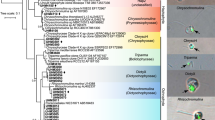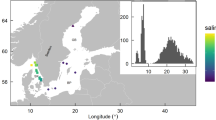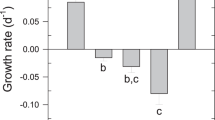Abstract
ATKINS1, in 1945, reported on the productivity of the English Channel as estimated by two independent methods. The silicate turnover indicated a far lower productivity than did the phosphate turnover, and from this he deduced that only a relatively small fraction of the phytoplankton could consist of forms with siliceous skeletons. Knight-Jones and Walne2 later showed that the very small nannoplanktonic form, Chromulina pusilla, was present in English Channel waters in numbers averaging about 1,000 per ml. They quoted other work showing that as much as 90 per cent of the phytoplankton may be small enough to pass through a fine silk tow net, and 40 per cent through a No. 2 Whatman filter paper.
This is a preview of subscription content, access via your institution
Access options
Subscribe to this journal
Receive 51 print issues and online access
$199.00 per year
only $3.90 per issue
Buy this article
- Purchase on Springer Link
- Instant access to full article PDF
Prices may be subject to local taxes which are calculated during checkout
Similar content being viewed by others
References
Atkins, W. R. G., Nature, 156, 446 (1945).
Knight-Jones, E. W., and Walne, P. R., Nature, 167, 445 (1951).
Hart, T. J., “Discovery” Rep., 8, 1 (1934).
Author information
Authors and Affiliations
Rights and permissions
About this article
Cite this article
MILLER, S., MOORE, H. Significance of Nannoplankton. Nature 171, 1121–1122 (1953). https://doi.org/10.1038/1711121a0
Issue Date:
DOI: https://doi.org/10.1038/1711121a0
This article is cited by
Comments
By submitting a comment you agree to abide by our Terms and Community Guidelines. If you find something abusive or that does not comply with our terms or guidelines please flag it as inappropriate.



